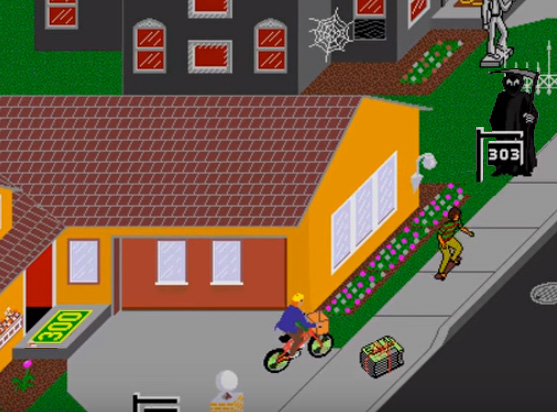
A Career of The Printed Word: Part 1
First post. Maiden launch. Let’s just call this website a personal notebook. I know what I’d like to do with this site eventually, but for now: a warmup. Working with a new web host using a new version of WordPress that functions differently (Gutenberg), a new “block”-centered theme; and trying to figure out how to edit text on a new iPad with the new iPad OS (v.13). Let’s see how this this newness goes, shall we?
I have been a web developer for a long time. Mostly I have been helping other people and organizations to share their words and opinions and to pursue their interests. But I never spent much time sharing my own interests, and I do have a decent variety of things that catch my attention. I don’t know who might be interested in this material, other than me. If you like it, yay for us; but “my point” is to finally have a place to scribble down my thoughts and make sense of my educational materials. There’s a lot of ideas and observations in this head, and I just want to get them out and put it in my own space. Why so public? I dunno, exactly. I’ve been working in print media media for most of my life, and that’s what we do everyday: publish our observations. And if what we write benefits someone in some significant way, then Halelujah!
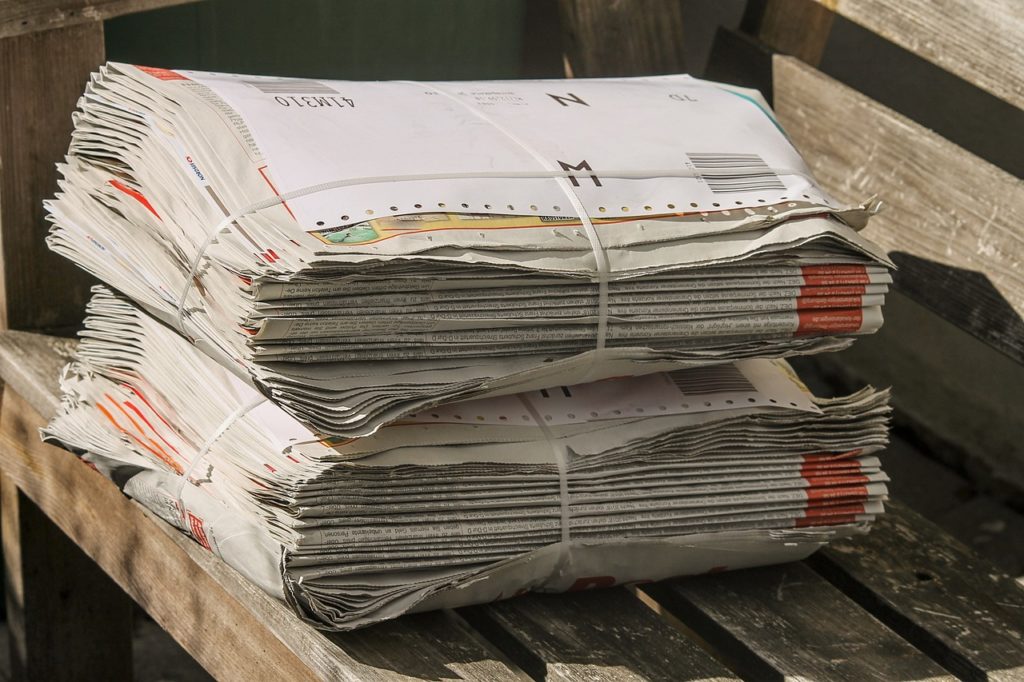
The Five Chinese Three Paperboy Brothers
When I was a kid, our family spent about 8 or 9 years being “the paperboys” for our neighborhood. I was the last of three brothers to engage in this occupation, and from the age of 10 to 16, I helped in the receiving and delivery of bundles of the Evening Sun paper to local homes. We also delivered big bundles of the Sunday Sun edition, too. Technically, the Evening and Sunday papers were separate products by the same city newspaper company; but, somehow, we ended up taking on the Sunday morning task when there was already another distributor for a third paper called the Morning Sun. I don’t think that the A.M. edition was nearly as popular, though, because it ceased printing halfway through my paperboy experience. I guess that tells you that people preferred to read after work, or maybe the A.M. edition was smaller, inferior or lacking in some way. The world of news, then, came to rest on my shoulders — quite literally; and it was a heavy burden indeed.
The bundles of papers would arrive each day from a delivery truck. The guys would drop them off atop a sewer drain in front of our house. Usually it was fine, but sometimes the driver would toss them out carelessly and damage some of the outer print. When it rained, they’d have to put them in bags to keep them safe. At some point, the company added an extra sheet of paper on the top and bottom of the stacks to prevent the tossing damage. Mostly they were brought to us on time, even early, but not always.
The bundles were held together by different materials over the years — at first it was normal, biodegradable twine; but then they switched to white plastic ropes instead. We had to cut these straps off of the bundles with scissors, and my family never threw anything away that was potentially useful, so we had miles of plastic, knotted together twine, because my father would use it for stuff like keeping the tomato and bean vines propped up in our backyard garden. Later, the company switched to using flat plastic straps, which were hard to get off; until we realized that you just flip it over and usually, just pull the underside of the seal apart by hand. You can’t do anything interesting with these kinds of straps, so it was just unrecyclable garbage. My mom was always very responsible and into recycling, and she still gathers bags of aluminum cans that people throw out of their car windows to the local recycling center for a few dollars in return.
Each day, we had to fold the individual newspapers and put them in bags or bands. Mostly, we used rubber bands — we had big bags of rubber bands in a cardboard box behind our front door. Sometimes we used 3-panel folds, sometimes 4. Occasionally, a smaller edition would roll up into a cylinder. The papers varied in size from day to day — Sunday was the largest and was usually unfoldable — you just put a stretchy, wide band around a flat newspaper paper. When it rained, it was really difficult sometimes to get those fat papers stuffed into the plastic bags without the bag splitting down the side. There was the side with the spine of the newspaper, and the more frayed side where the pages were cut. It was easier to put them in frayed side first, because the spine was thicker and tough to squeeze and get into the bag. Once we got part of it in, we would kind of tug on the bag to get the whole thing to plop in. I don’t think the bags rolled very well.
Actually, now that I recall, we got the Sunday paper in two separate parts. The first half arrived on Saturday afternoon, and it had lots of coupons in the middle, and classified ads and the entertainment section. And then the Sunday half had the latest updated news sections — that part was so boring to me then. I suppose we were tasked to deliver the two parts together on Sundays, but it was far too much weight for our station wagons. So, we would usually double-up the work load, and deliver the Saturday entertainment section first, and then the Sunday. We had to get up at 4 or 5 am to get them done by the time people would wake up. Usually, we boys would deliver the paper by ourselves after school; but on Sundays, we would drive up and down the streets with the tail door of our station wagons hoisted up in the air, with us hanging our skinny little legs out the back. When we’d go up a hill — and especially if they had to be bagged in plastic — we would have to lean in and hold all of the papers from falling out of the back of the vehicle. When it rained, the lifted hatchback served as a canopy for us. Yuck. It wasn’t exactly the safest way to go about child labor, but people didn’t have so many safety regulations and cops readily handing out tickets back then.
Wednesday was the second largest paper of the week. I think that was because of an extra mid-week emphasis on classifieds. Tuesday and Saturday were the smallest, if memory serves me correctly. The way the rubber bands fit was different each day. Sometimes they would wrap 2 or 3 times around, sometimes only once. It had to be on tight enough to hold the paper together when tossed a short distance. You didn’t want the paper flopping out as it hit the porch or ground. Sometimes the bands would pop when tossed, and we’d have to stop and fix it. Often, it was just easier to put the loose paper under the edge of a doormat so it wouldn’t blow away. Sometimes the doormats would be wet, so then it might get stuffed in a big enough mailbox, or we’d have to open the screen door and slide it in quietly. I never wanted people to answer the door when I did deliveries. Creeped me out.
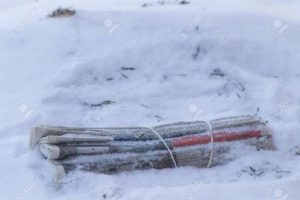
The rubber bands made distinctive sounds as we rolled them down the length of the folded paper. And sometimes they would snap and sting our hands and forearms. There were lots of paper cuts, too. Youch! We had thin rubber bands for most evenings and thicker bands for heftier editions. We had to purchase these plastic bag and bands as “supplies” with our own money from the manager, and had to order them ahead of time so that we wouldn’t run out. The bags were pretty expensive, but necessary. We always seemed to be low on bags. They came attached, stapled together with a cardboard hanger at one end. If we stepped on the bags, we had to catch our balance because they were super slippery when they rubbed together. I think they were clear at first, and then they changed the color to orange to be more visible. It was not easy to predict the weather every day, and sometimes, I’m sure, some of the papers got wet because we had put a band on them thinking it would be clear and sunny, and then an afternoon storm would come by as soon as we stopped.
We also had to buy a newspaper delivery bag or two, with the company logo on the side. They were canvas sacks which had a strap that went over one shoulder. The sacks didn’t last forever, so we had to replace them on occasion. The sack had one large opening on top, and we had to figure out how to stuff all of the papers in there at once to get to all the houses in one trip. They made the strap orange at some point for added safety. The bags were filthy and gray, always — from the newspaper ink mostly, but also from our sweat, and from getting wet in inclement weather. The strap had a shoulder pad, but it was completely inadequate. It felt like a steel wire some days because of the weight and walking around for long periods. Actually, I mostly rode a bike; and or later on, I would take to using my brothers’ skateboards. I had a hard time stopping those things, and smashed the wood noses of their boards so bad on the curbs. My brothers weren’t using them anymore — they’d grown out of being skateboarders. But decades later, one of my brothers asked me where his old board was, and I was like, “Uh, I haven’t been in that old house for more than 25 years, how would I know where your board is?” Partly, I was thinking about how badly I mangled and splintered the wood, and didn’t want him to see. Why feel guilty after decades passed, when he could just easily afford to buy a brand new one for his grandson? Sentimental importance, I suppose. Anyway….
Collections, Culture, Complaints
The second major task of the newspaper job was to “do collections” — that is, to go door-to-door once a month to get paid for our work. We had these flip books with a black leather-like cover that had metal rings at the top. And then there were these pre-printed cards — rectangular strips of removable tickets that had the different weeks and costs on them. As far as I can remember, we were supposed to write the address and name at the top. And there were 4 different colors for the tickets — green for Evening only customers, pink for Sunday only customers, yellow for both Evening and Sunday; and then blue, which we hardly used, and I can’t fathom what they were for apart from the other scenarios.
Sometimes the central sales office would get us a new customer to add to our list, or tell us to stop. We never really sought out looking for additional sales. Sometimes people would see us and ask if they could get the paper, which was fine. Usually, if people wanted to put a hold or were moving away, the people would tell us during the collections period. I think the cost for a month of the Sunday paper was $3.30 and the combination was $7.60 for a month. I really disliked collecting, because it was difficult to get many customers to pay. We had to keep going back and knocking and waiting. And I was more worried about their customer satisfaction than I was about getting paid what I was due. Honestly, sales will never be “my thing,” though I have been excellent at many customer service jobs. There were people who were home, but they wouldn’t answer the door. Mmm hmm, thanks for all my hard work.
I cannot say that I loved doing the deliveries at all — 365 days a year, no matter the weather, no matter how my health or energy suffered, no matter what else I had to do for school or personal interest — it was my “job,” and my mom made sure we were committed to providing our customers with excellent, reliable service. We virtually never went on vacation or stayed at relatives or friends homes. Once in a while I would go to my grandmothers for a week, and I guess my family covered my route, but it grew into such a responsible responsibility, that fun time just wasn’t an option. Customers were waiting; and the news does not ever stop.
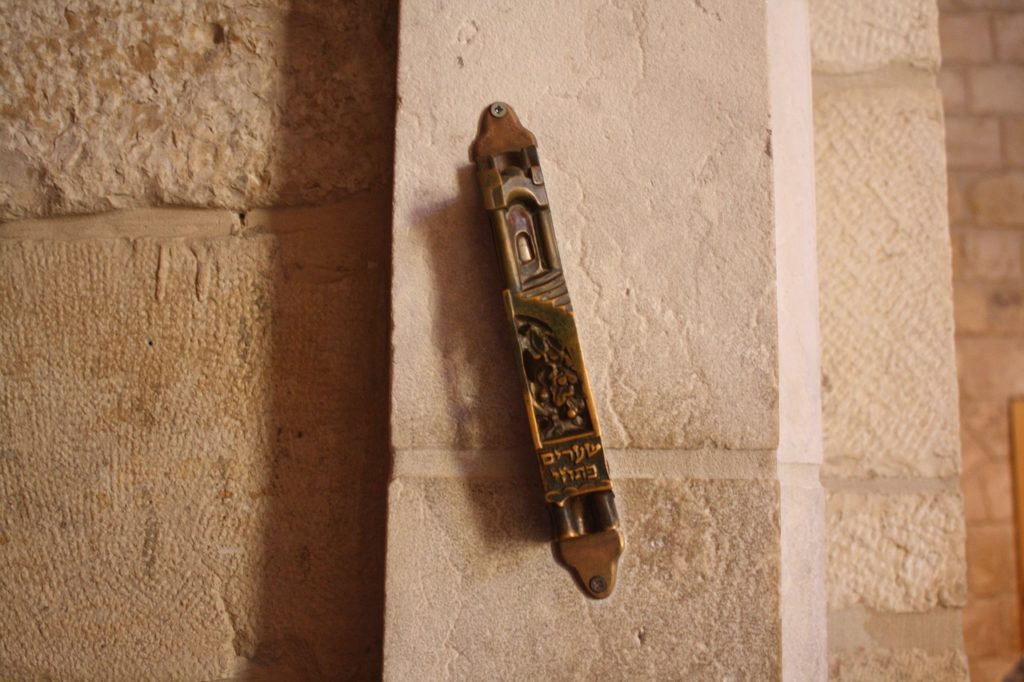
In fact, for a few years, we added a second “route” to our family’s duties. My oldest brother mostly took on delivering to a tall apartment building across from our Methodist church, The Balmoral; but sometimes I had to cover his route, too. It was a lot of work, and we had to get up early so we could hog the elevators before the residents got up and moving. It was different, though. The work was indoors mostly except for a few add-on townhomes. I’d never been in an apartment building before starting that route. Everyone I knew had a home, a semi-suburban, detached house of their own, and I wondered why people chose to live in apartments. The smells in the hallway changed from floor to floor. Collecting was a different experience — there were no porches, so either you waited out in the hall, or you walked right into the middle of their existence. A lot of the people who lived there were elderly and Jewish, and they had these decorations on their doorway. A mezuzah. I never saw what was in them, but I believe there were biblical words put on little scrolls, and these were inserted into the mezuzah. It seemed like a foreign concept to me, but so many people there had one, that I grew to like them very much and thought they were cool and pretty and unique in their differing designs.
My hard-working mom was always trying to make an extra buck for us then. And she got herself another annual side-gig as a distributor telephone books — like the fat, heavy, full-sized directories of that era. And we had big stacks of those yellow or white pages to deliver to another neighborhood of low-rise apartment buildings. Not the nicest part of town, so she didn’t take me there much; not after dark. Maybe on Saturdays during the daytime.
Sometimes the bundles of newspapers were delivered to us late, and so we would be late with distribution. The customers would call to complain to us. I think it was supposed to be done by 6 or 7 P.M. sharp, and one or two of them would ring us as soon as the hands would hit the “late” time on their clock. If we did not have the papers ourselves till after dark, some of the customers would go and ring our regional manager to tattle on us. Why, I don’t know because we had not received our bundles, so what could we do? Occasionally, the bundles were counted short or we had to replace damaged copies — and we would have to call and wait for the district manager or driver to come by with extras; or we would walk to the corner shopping center, and use a distribution box to buy extra copies as replacements. Those metal pay boxes were kind of curious inventions to me. You put in your quarter in the coin slot, and then only take out one copy; but you could certainly take out more than one copy, and no one would ever know. Not like they had security cameras recording anyone way back when. I guess people were pretty honest overall in days past.
Truth be told we did not get very many complaints — they stuck out as odd and annoying, not because we failed and suffered reminders — but because we did work so hard to do a great job! People just had a routine, I guess, and they really loved reading their newspapers. Most of the customers appreciated us accordingly, I do believe. During the holidays, they would give us a tip sometimes — probably less and less over the years, though, as the prices increased. I was always grateful for anything extra. Sometimes it was cash. Sometimes it was McDonald’s food gift certificates. It wasn’t aN impoverished are, but it was far from wealthy. And all of our houses were tiny compared to the McMansions people are have built around there these days. We weren’t really brought up to accept gifts without feeling a sense of guilt or undeservedness about it. Weird, but true. So, we just had to not be showy or expectant about it, and to be modestly encouraged by the customers’ small recognition of our efforts.
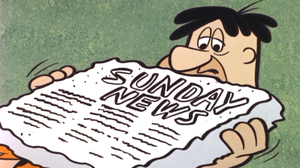
Escape Route
There was no break for us from this daily delivery routine: Get up and go to school at 7 A.M., come home, decompress briefly with the Flintstones or He-Man; and then go do the deliveries until about 7 P.M. My grades and social interactions suffered because I had employment expectations.
Who knows what was in all the ink and paper-making chemicals, too. The ink and plastic bags and rubber bands all had distinct chemical smells, and the delivery sack had a combo-stench all to itself. Washing it regularly never made much sense because it was just going to get dirty again tomorrow, just a few more hours. Seriously, that was no job for a kid, It was a lot of work and dealing with difficult adults; and I was miserable and spent a lot of my money converting dollars to quarters to play Joust, Mrs. Pac Man, Phoenix and Robotron 2084 — to escape and insert some imaginary interest into my life. I was kind of an emotional, sometimes angry kid when I’d play those games, too. I just didn’t enjoy my existence much then because there was just no time for fun and friendly interaction. I ended up with a lot of guilt from not doing the collections properly with the people wouldn’t pay. And then squandering lots of the earnings on quarter-eating monsters at the Security Square Mall arcade, or Record Theatre, or 7-Eleven or Al’s Pool Hall. Walking away each day with nothing to show for it other than time away from family and reality. Somewhat ironically, one of the video games I ended up liking at the arcade was called Paperboy:
The one thing about newspapers that I did fall in love with was the comics pages. My mom loved the coupons, and she would pull them out and hand me the comics. I just loved the way that artists combined graphics and words to create these little characters — characters with lives and predictable personalities. Characters who helped me to interpret the world and human behavior, and to lift my spirits for just a little bit. I loved the tiny dot patterns of the ink on the newsprint. And sometimes the 4-color plates were off-register so badly that the pages looked like an Andy Warhol creation. For the first years, the ink was all black on light newsprint, but then the company started having certain limited numbers of pages in color. The comics usually came in two sections for some reason. I think they were used as a kind of wrapper for the coupons. Eventually, they put the coupons inside of plastic bags. I think they were probably being printed far in advance of the papers themselves at that point.
I eventually grew into reading the rest of the paper, and I appreciated how important the paper was to other people. I witnessed how much people depended on the news to connect to the larger world, to be informed and involved to some degree; though in historical context, reading the paper was about as interactive as television news — a one-way dissemination of information and opinions. We didn’t have comment sections, Facebook posts and retweets, or links to contact the writers directly. A different world now, completely.
When I turned 16, I quit. I was sick of it, and wanted an actual paycheck, and to interact with human beings and coworkers. So, I got me a job at McDonald’s. And, I thought I’d never go back….
Never say never.

